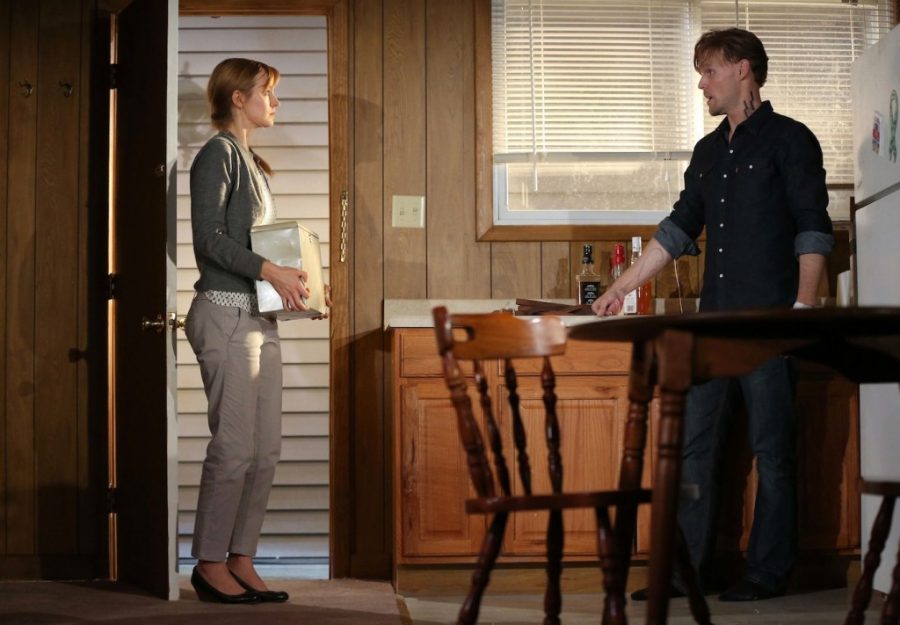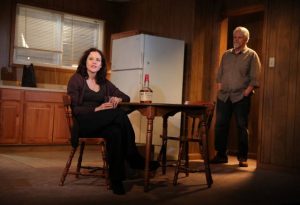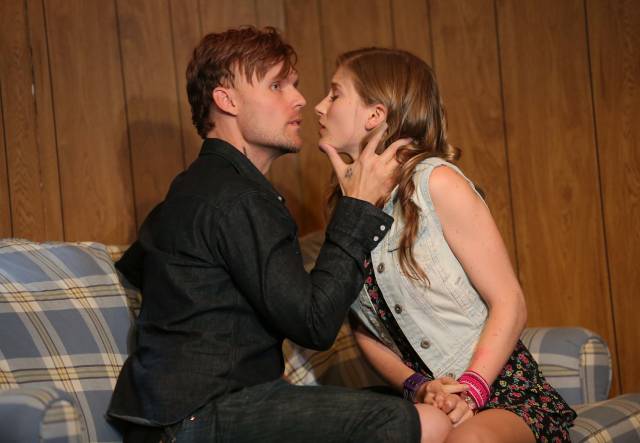

A few minutes into The Long Shrift, Robert Boswell's new play at the Rattlestick Playwright's Theatre, and Sarah and Henry, a middle aged couple, are in the midst of what is surely not their first argument over their son, barely out of high school and sitting in a Texas jail after being accused of rape his senior year. They've seriously downsized (Sarah can't seem to wrap her head around this fact) to pay legal fees, and between hearty slugs of whiskey, she hisses, "Rape is one of those words that make people go into a frenzy. They turn absurdly political. I don't even know what the word means. No one does."

I saw The Long Shrift on Friday evening, and over the weekend, chewing over what I had seen, I told several of my friends that I had (a) seen a play about rape, and (b) that it was written and directed by men. Without disclosing anymore information (it could have been a musical set in the Middle Ages for all they really knew), they all, across the board, had an opinion, and across the board, it was a strong one. So yes, I would have to agree with these words right off the bat; rape is something in our culture that is absolutely volatile -- horrific, polarizing, confusing, political. Boswell has created a microcosmic world, a turned down, low rent, trailer of a home in Texas, as a space to set his players loose and watch them squirm, to explore the semantics of something that, conflictingly in this day and age, is both a topic on everyone's lips, and something never to be discussed.
The very first action that takes place on the stage is that of Richard's mother, played acerbically by Ally Sheedy, unpacking her favorite vase, a final, fragile vestige of their once happy home. And ultimately, from start to finish, this play is all about packing and unpacking. It is about trying to make sense of, and in some cases, break out of, various boxes we find ourselves in. The play, thanks to a handful of heartfelt and gut wrenching performances, wants to question what it means to be a victim, a redeemer, a criminal, a husband, a wife. What it means to be in love, what it means to be violated, what it means to be young, and drunk, and make a mistake that changes the course of your entire life. With low ceilings, and no furniture to speak of save a ratty couch and table, the stage becomes its own box, suffocating, holding in the anger, frustration, confusion, and sadness that has been left to stew for years. When Richard Singer comes home on the eve of his ten year high school reunion to find himself confronted by the very woman who recanted the story of rape that put him in prison, the pressure cooker boils over. Without much space to work with, director James Franco choreographs a primal ballet set in the heartland of America. The characters become like caged animals, circling each other, getting close and then backing away, an elaborate dance of suspicion, hatred, guilt. By the end of the play, every gesture and touch becomes supercharged, a potential for danger and violation.

In choosing to write a play about rape, Boswell opens up a door, much like the broken one to the door of Henry's (Brian Lally) modest home which he's worked to keep open for his son's return, and he wants to walk right through it, but in a way I feel that he hovers, not quite coming through the threshold. Do we need to hear a story about a false accusation when there are so many (So. Many.) untold stories of rape and victimization, stories that go unpunished and unacknowledged? Yes, Boswell tells a nuanced story, but could he go farther? Perhaps. By the time he really goes there with pushing the limits of character expectation, creating some gritty, toe curling moments, our caricatures of these people are set. Yes, the mother is conflicted, but she's an aggressive alcoholic with a wandering eye, who won't visit her son and nags her husband, who's such an unflinchingly "good guy," you almost can't believe it. Richard, played by Scott Haze with a sexually charged, hyper-masculine bravado is angry, so, very angry, and Ahna O'Reilly as Beth M. plays the perfect wilting flower, ready to take his abuse and crawl back, shaking, for more. As I mentioned earlier, honest and bold performances by the ensemble help to flesh these characters out beyond cliche, and a darkly comic turn by Allie Gallerani as Macy, the bouncy, current high school president, eager to land herself a spot at Yale, adds a much needed levity to this (to borrow another quote from the play), "box of misery."
A play like The Long Shrift should be commended for the sheer fact that it forces us to think, and to look, a little too closely, at something we want to run from. Robert Boswell tries to put rape out into the open, in a sense, and I believe, strives to create intelligent and thoughtful dialogues that will help us to better understand all of the victims and lives destroyed by rape and a culture that might set the stage for such violent crimes. It appears that we have a lot of unpacking to do, and this box seems like a good place to start.
The Long Shrift runs at the Rattlestick Playwrights Theatre from July 7- August 23.